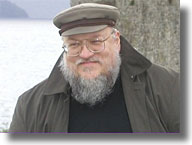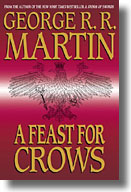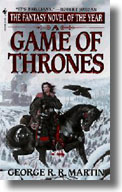|
By Tasha Robinson The first three books�1996's A Game of Thrones, 1998's A Clash of Kings and 2000's A Storm of Swords�established an immense, beautifully realized and incredibly detailed medieval kingdom full of schemers, plotters, warriors, bystanders and victims, all caught up in the "game of thrones" as one ambitious family attempted to seize power, causing the entire country of Westeros to collapse in civil war. Readers have impatiently waited for five years now to see Storm of Swords' stunning cliffhangers resolved, but on Nov. 8, the wait will finally end with A Feast for Crows, the fourth installment in the series. Science Fiction Weekly caught Martin on the phone in August�just after a vacation abroad and just before he left on an extensive publicity tour�and talked with him about the series, the new book and his writing in general.
So once you decided not to put the five-year gap in there, how did you address the problem of those younger characters? Martin: [Chuckles] Read the books when they come out, and you'll see what I came up with. I'd rather not reveal anything on that front. Bran is not actually in this book. Since he's one of the characters beyond the Wall, he'll be in the next book. So I didn't have to deal with him. Arya's in this book�she'll be one of the characters in both books. Do you have any concern about fan ardor cooling over the long gaps between the books? Martin: Well, I do, in theory, yes. But on the other hand, it doesn't seem to have cooled. As far as I can tell, it's as strong as it ever was, and maybe even stronger. I mean, I have gotten a few letters, some as long ago as two or three years back, from people who have gotten fed up and said they weren't going to read the series anymore. But for every one of those, I've gotten 20 from people saying, "Take as long as you want, we'll be here when the book comes out." Which seems to me a much more sensible attitude. I'm reading dozens of series myself: I just read the new Flashman book by George MacDonald Fraser, which is a fun series of historicals. And when was the last Flashman book? I don't even know. When will the next one be? I don't care. But when it comes out, I'll read it. But this getting so upset over a book being delayed that you stop reading the series has never made any sense to me. But some people feel very strongly about it. I think part of the problem was that dates for the book were repeatedly announced, and then when it wasn't delivered, they would change that. And of course, every time they did that, I'd get hundreds of angry e-mails. If I had my preference, no date would be announced until the book was delivered. You're spending the next few months on tour. Do you enjoy book tours? Martin: I do enjoy it, but it's very tiring. I wish I was 20 years younger. I could have really eaten this up when I was 35. Travel in England is a little easier, because you have a driver and a car, and sometimes you take a train. But in the States, because we're so big and spread out, you have to fly everywhere. And you know what flying is like these days�you have to get to the airport hours early, and get through security checks, and wait around, and you do a city a day, it wears you out. But I do enjoy getting into the stores, meeting the managers and the readers. Some of the stores, I do Q&A sessions, others I actually read a chapter from the book. That's always fun, getting the direct response, when you read something and can see how the audience likes it, or does not like it. So it's fun, but tiring, and it takes a big chunk of time out of my work. When you and I last talked five years ago, we discussed how much you tend to get caught up in your characters' lives. Is that still true? Martin: Oh yeah, definitely. I think I was pretty involved with most of these characters right from the first, though I suppose the relationship deepens the more you write about them. I have a greater emotional investment in a character who's been around since book one than in a character who's new in book four. Because they've been with me so long, they're old friends. But anyone who's a viewpoint character, you really have to empathize with him and get inside his head for it to work. Also five years ago, you were just starting meetings to discuss the Song of Ice and Fire TV series. What's the status of that project? Martin: Nothing has come of any of it. Do you think it could be done? Martin: It could possibly be done as a TV series, but I don't think it could be done as a movie. It's simply too complex and too big to fit. But you'd have to get a commitment. It'd really have to be a miniseries. I don't know that any network would be willing to commit to doing as many episodes as would be required. Would the interest be there if you were willing to compromise your vision? Martin: No, none of the discussions really got that far. In any case, if at this point in time I sold the rights to do the series, I really would not be involved except as a consultant, because I simply don't have the time. I have several more books to write, and I can't stop writing the books to adapt the books that are already written into a TV series. I'd never finish it that way. Now, once the series is done and the books are already complete, if at that point someone wants to adapt it, I might be interested in being more heavily involved as a screenwriter or producer. But at this stage, it would just be a rights sale if anything did come of it. Having worked extensively in television, you're certainly aware of the kinds of compromises that go into bringing something to the screen. Even if you were closely involved, could you bring it to the screen in a way that would satisfy you? Martin: It would need to be HBO or something like that. They're doing wonderful things right now with shows like Deadwood and Rome. But certainly my series is very adult. It's not a kids' fantasy by any means. It's gritty, the violence is real, there's sex, the characters are all morally ambiguous. This is stuff that traditional networks don't necessarily like. They want likable characters, good guys and bad guys, simplified storylines. And although things have certainly loosened since the days when I was working in TV, there's still Standards & Practices, censorship over how much sex and violence you can actually have. So if we did do it, it'd have to be on HBO or some equivalent network. You've talked generally about how growing up in the '50s and '60s has shaped your worldview and your books, but can you give a specific example? Martin: I think the attitude toward war is definitely shaped by my experiences with the controversies of the Vietnam War. War is central to a lot of fantasy, going back to Tolkien and beyond, but in most modern fantasy, it's very much the good guys fighting the bad guys. The Dark Lord is about to take over the Earth unless the guys in white cloaks stop him. I don't tend to think things are that simple�I think my generation was disabused of that notion by Vietnam�and the wars in my books are much more morally complex. At one point in 2004, you said on your Web site that the results of the 2004 election had left you too depressed to write � Martin: Yeah, but that was for about three days. Then I started writing again. Though having that statement up for three days got me hundreds of e-mails, either commiserating or cursing me out. So I guess you've got to be careful what you put on your Web site. Cursing you for your political view, or for not writing? Martin: A bit of both. Does your work on these books take as much research as it used to, or is that mostly out of the way? Martin: Well, I never stop doing research, because you never know what's going to be useful. I just came back from about five weeks in England and Scotland and Ireland, where I visited a number of castles and cathedrals, medieval cities, walled cities to walk around. It's not like I'm looking for some specific answer, but sometimes just walking around, getting a feel for a place, you'll see something or learn something you didn't know about, and who knows where it might be useful somewhere down the line? You've been working on this series for about 10 years now, and the fourth book is just coming out, so in theory, you could be working on it for another 10. Are you ever tempted to set it aside and work on other things? Martin: I do sneak in other things from time to time. I continue to edit the Wild Cards series, which is still coming out. I occasionally do a novella, though lately those have been the Dunk and Egg novellas, which are set in the same world. Yeah, there are other stories and things that I have to write, but it's just a matter of time, finding the time to do them, and I don't have the time right now. So while I might be tempted, I have to fight that temptation. With Song of Ice and Fire, you've said that the inspiration hit you strongly and was just something you had to write. Does that happen often? Martin: That was a rare occurrence. I haven't felt anything like that since then. Do you enjoy the work itself? Martin: Not especially, no. There are days that are good where you lose track of time, and you're so immersed in what you're doing, and the words are really flowing, and suddenly you look up and it's dark outside, and your morning coffee is still sitting next to you, ice-cold. Those are great days, but they don't happen very often. Mostly, it's a struggle. I enjoy having written. [Chuckles] It's a great thrill when a chapter's actually done or a book's finally finished, and you have that sense of accomplishment, and you read it, and it's good, and it seems to do what you want it to do. But before you reach that stage, there's a lot of hard work. There are days when I get up and read what I did yesterday and I say, "Oh God, this is terrible. I've got to rip this all apart and do it over." So I don't think writing itself is fun, at least not for me. But having written is fun. Do you ever go back and reread your old work? Martin: No, not really. I think especially the older ones, those stories exist in my memory, and I suspect they're better in my memory than they would be in person. [Chuckles] If I went back and reread some of the stuff I wrote back in the '70s, I might be very critical of it, and wince as I read it. Because, you know, you change over time, and hopefully you get better. Whether you think you're getting better or not, you certainly think you are. So I don't reread my old work. I leave that for other people.
|





